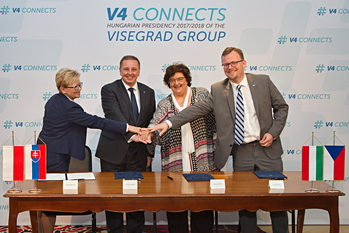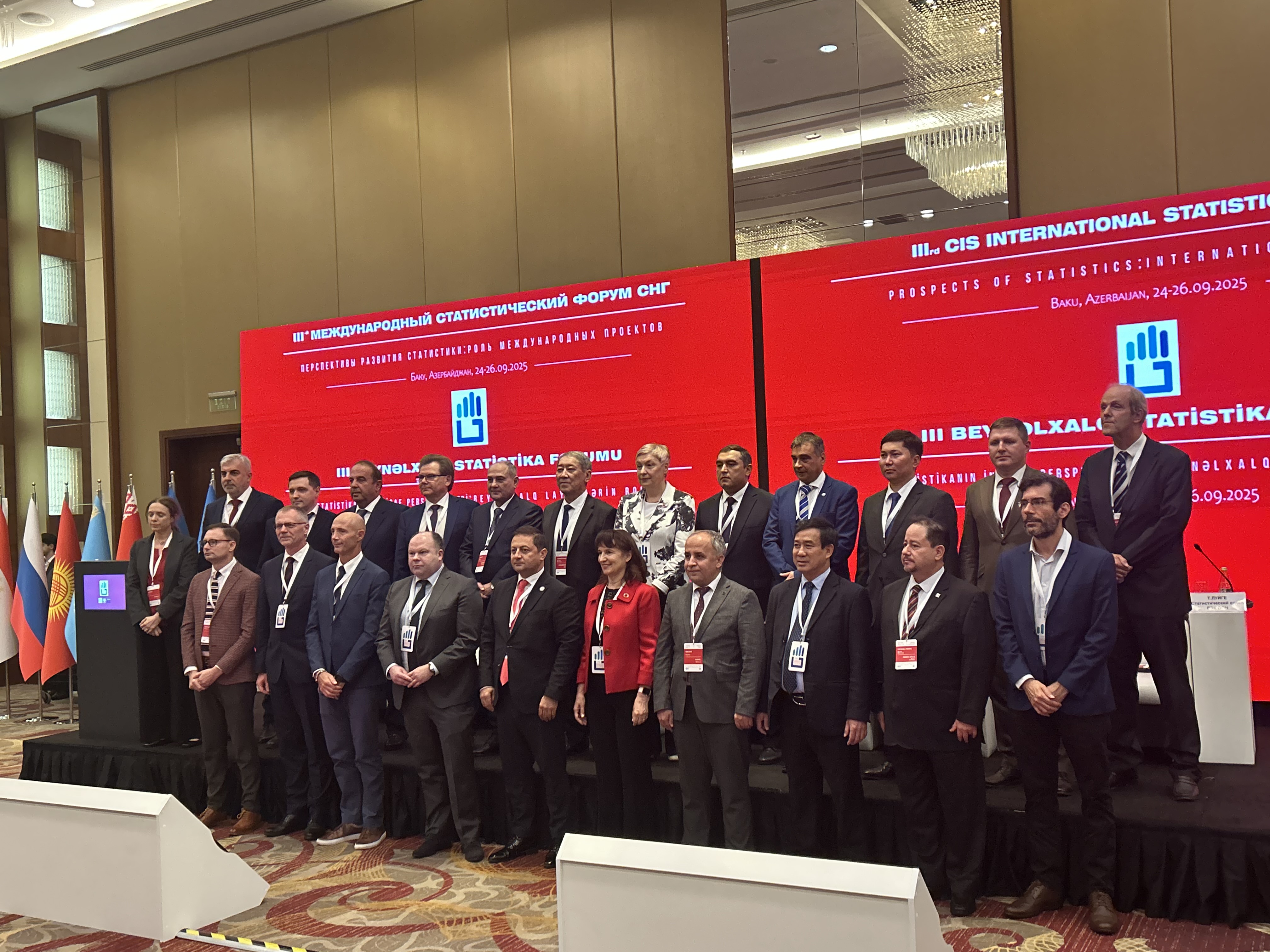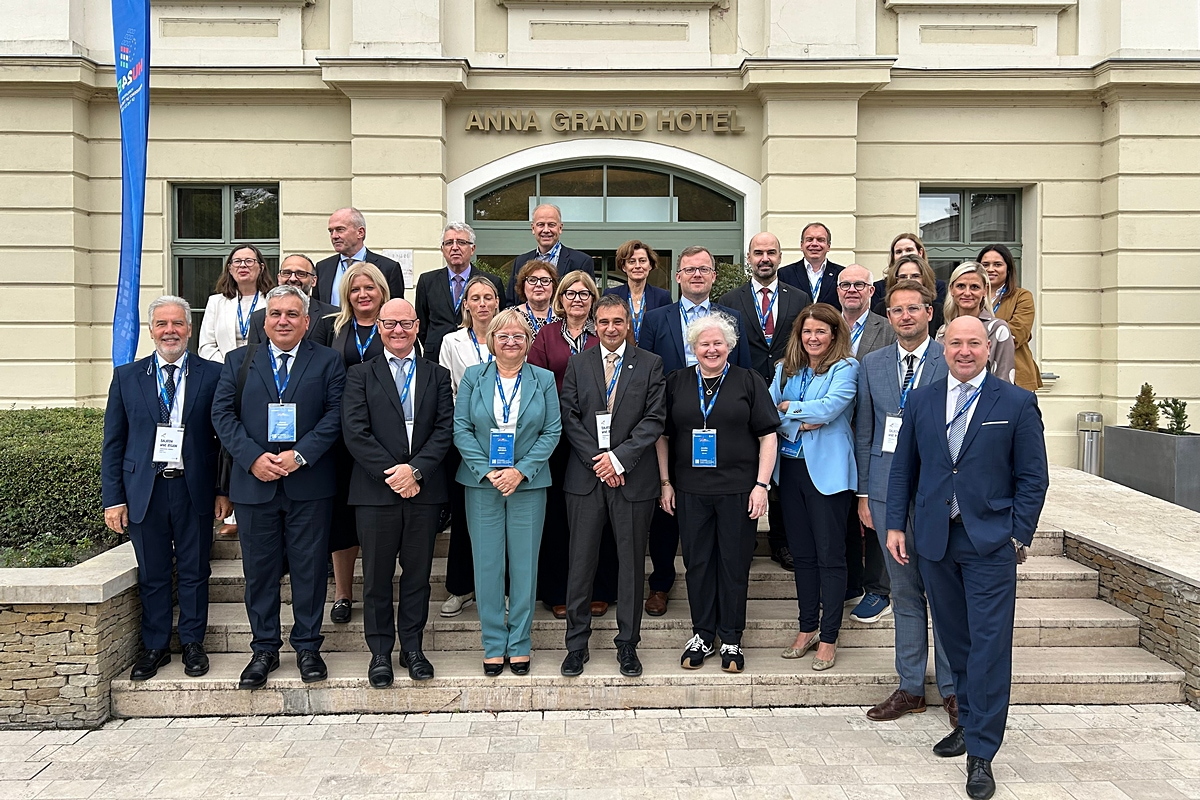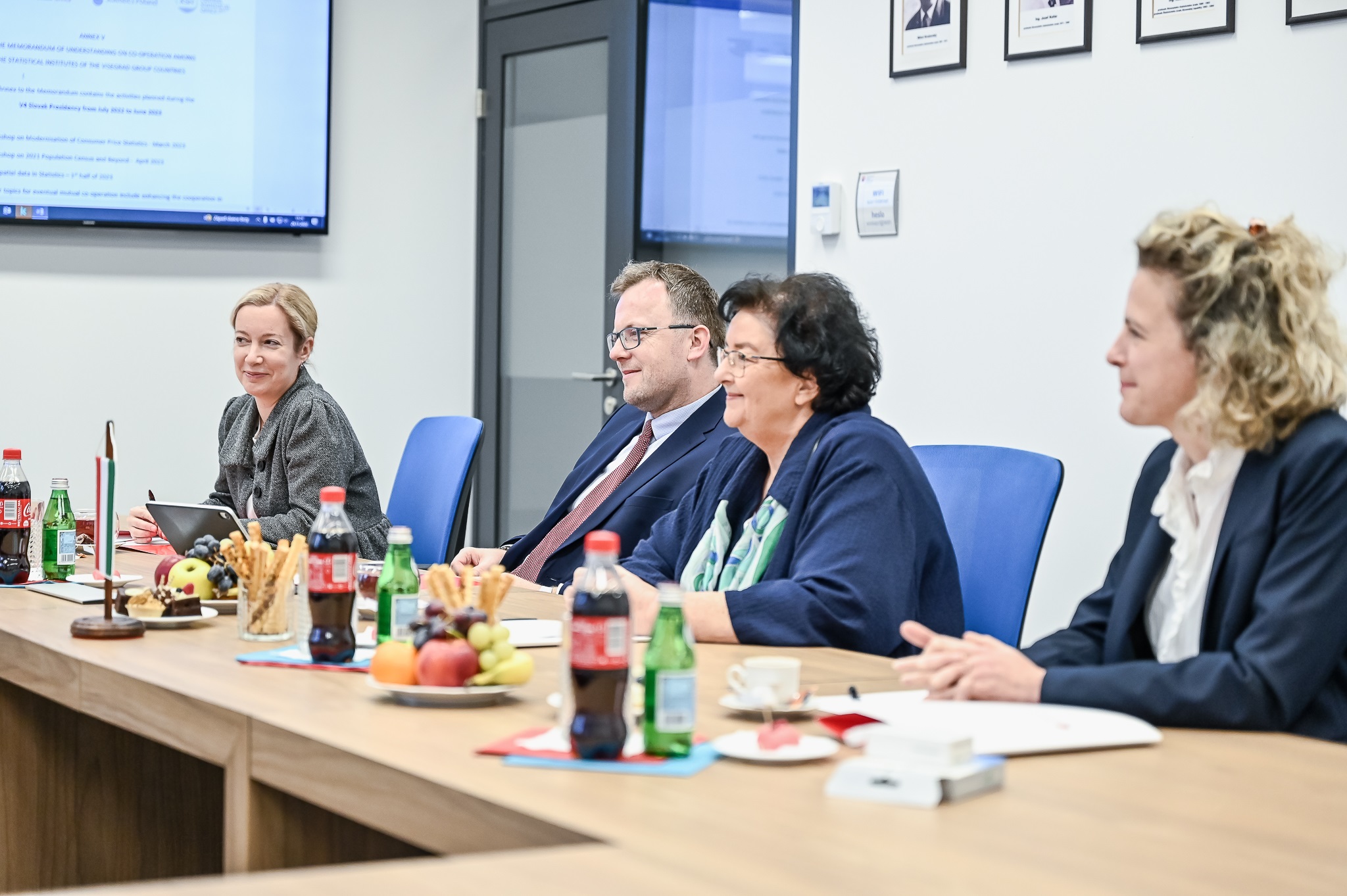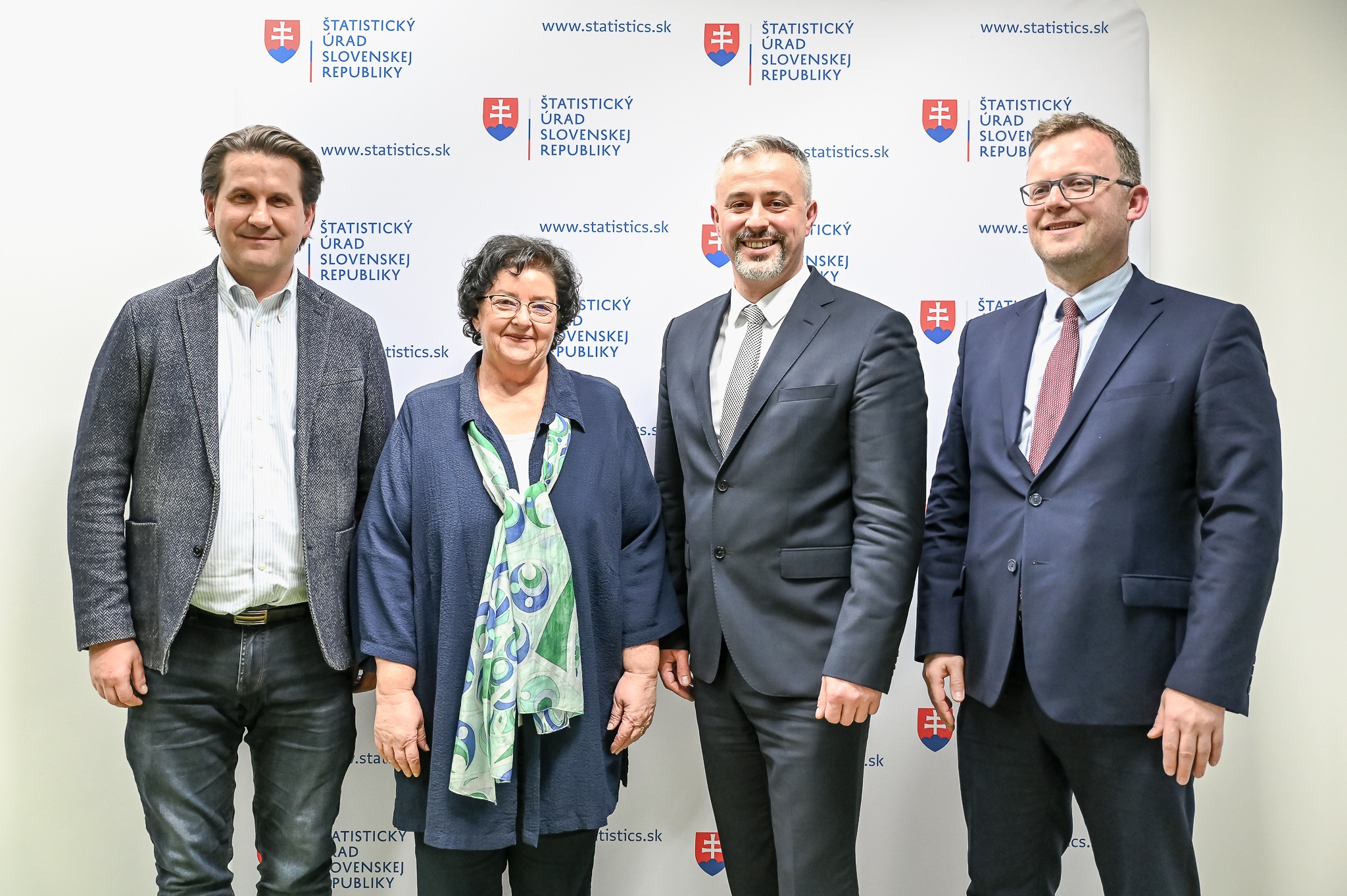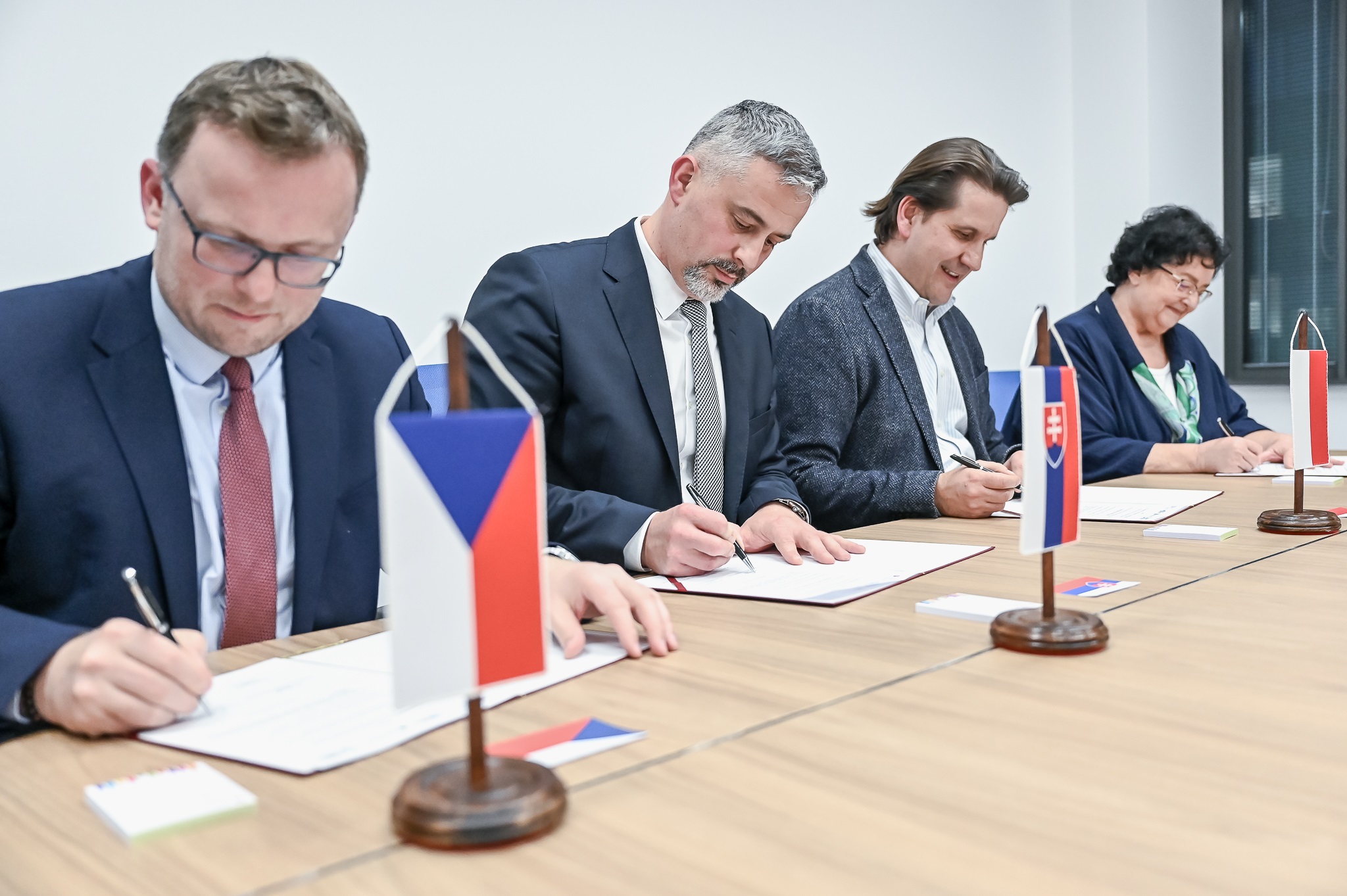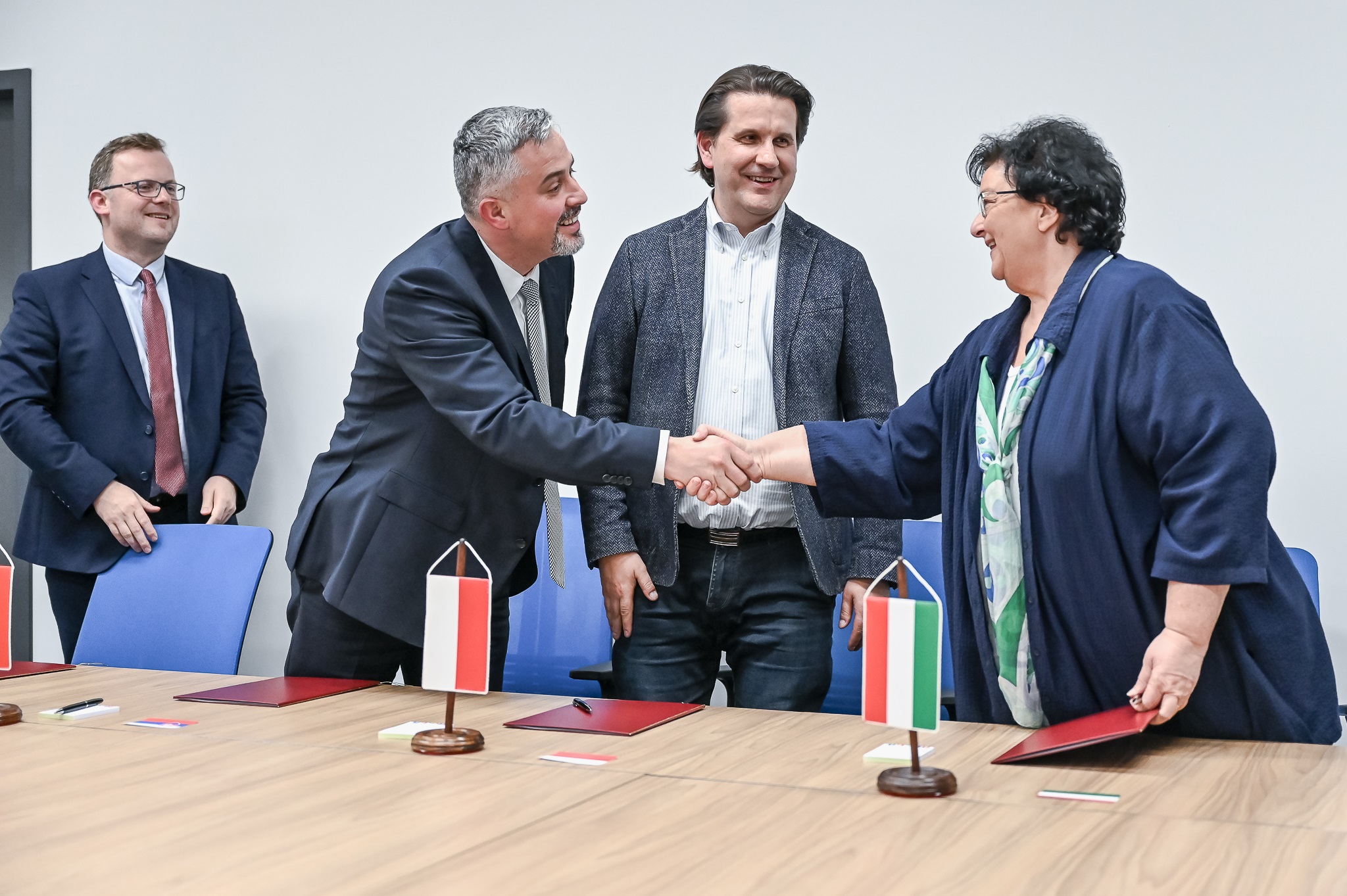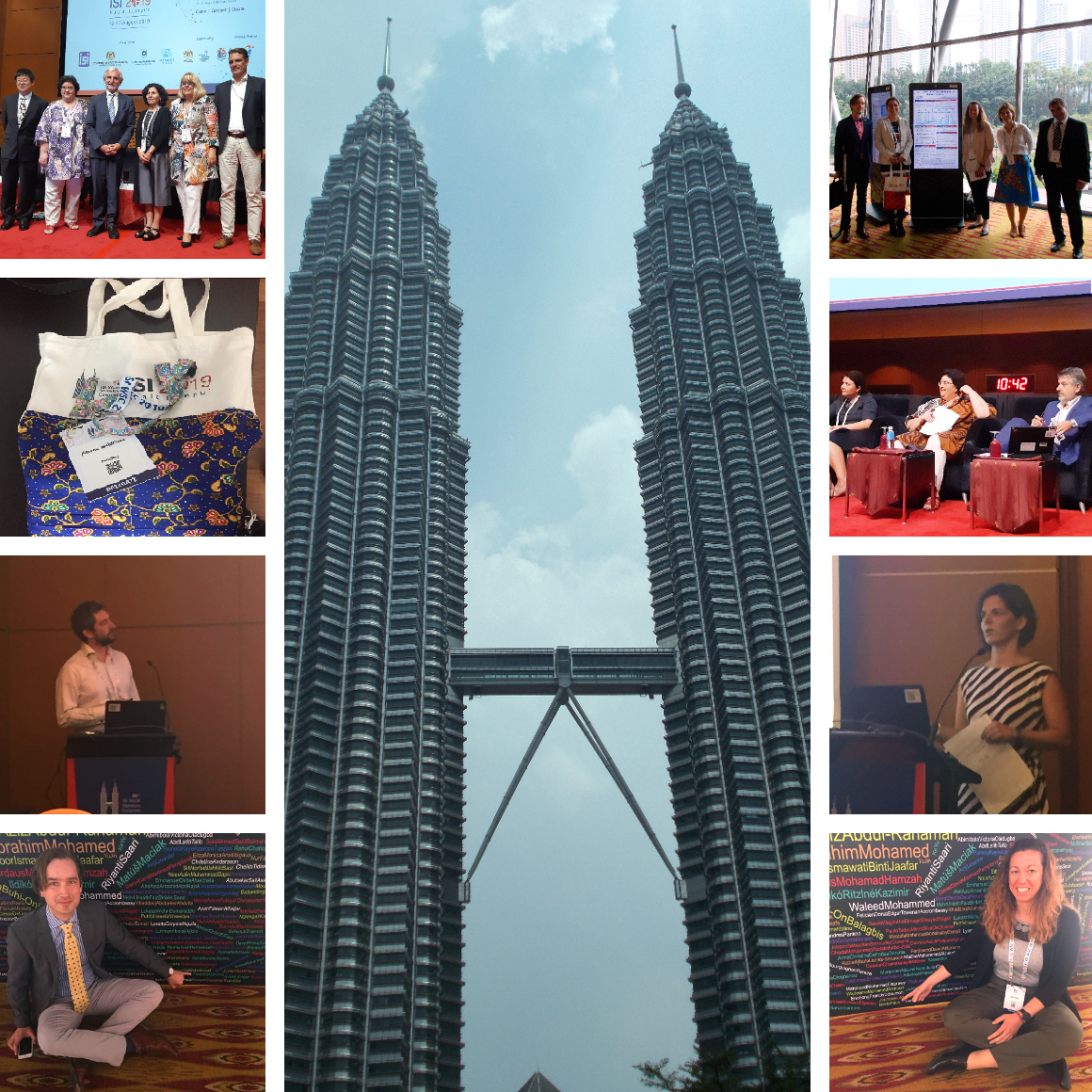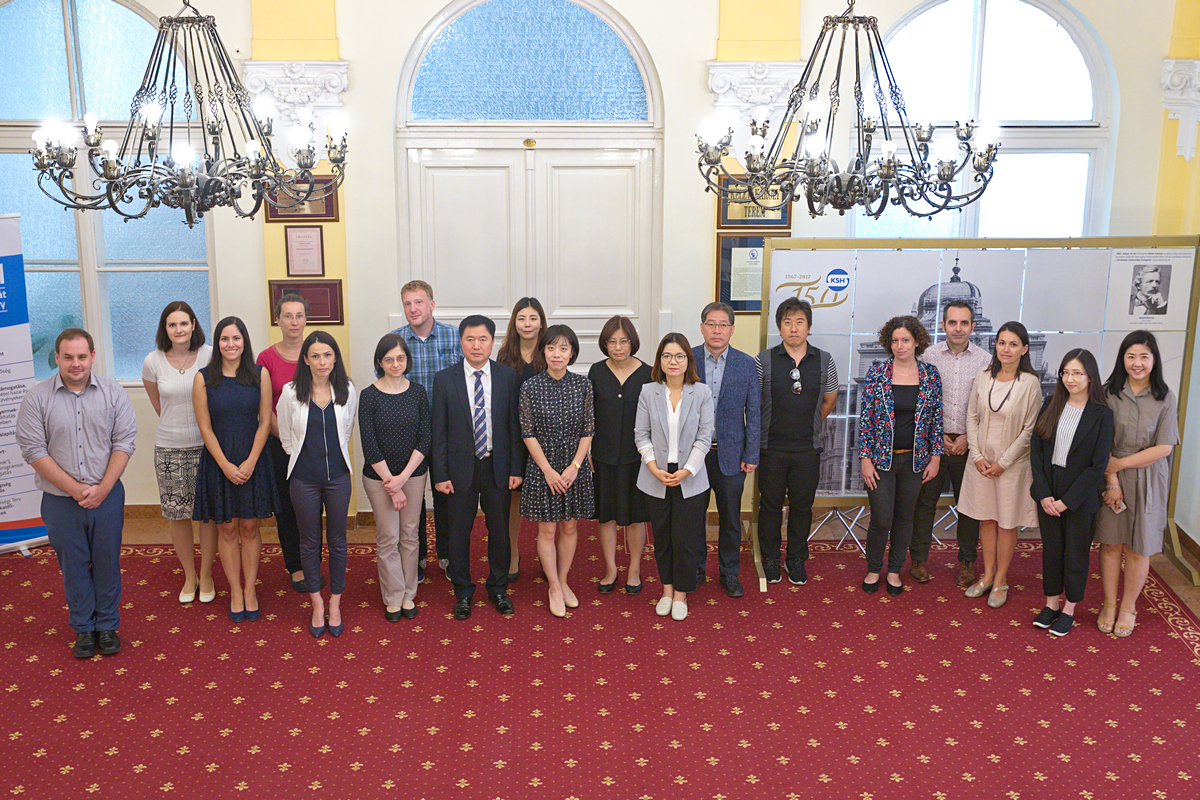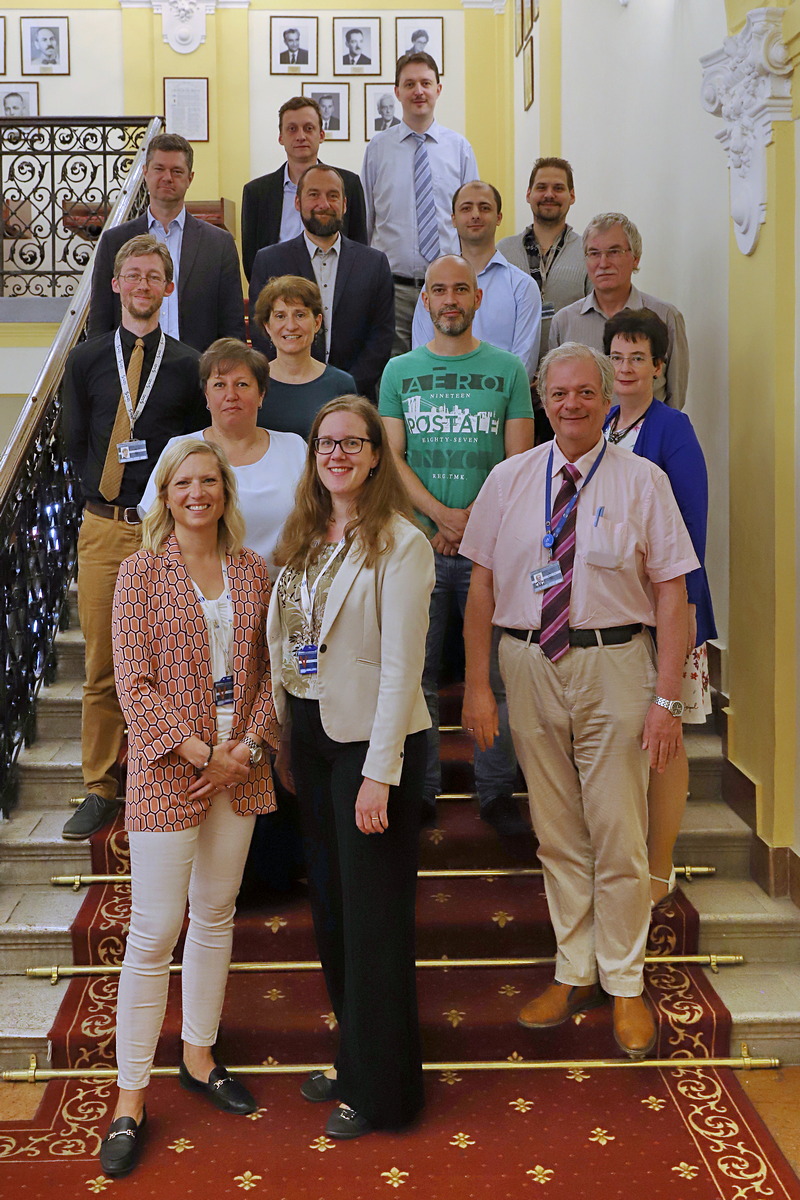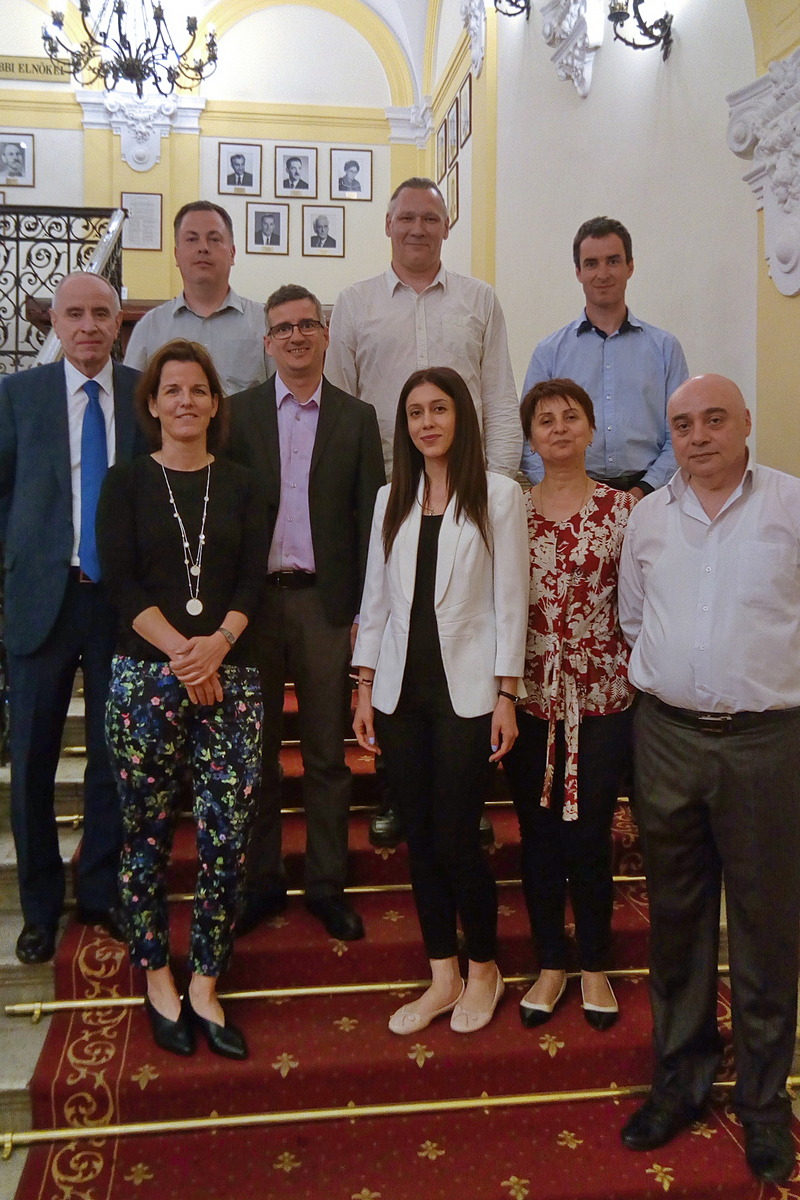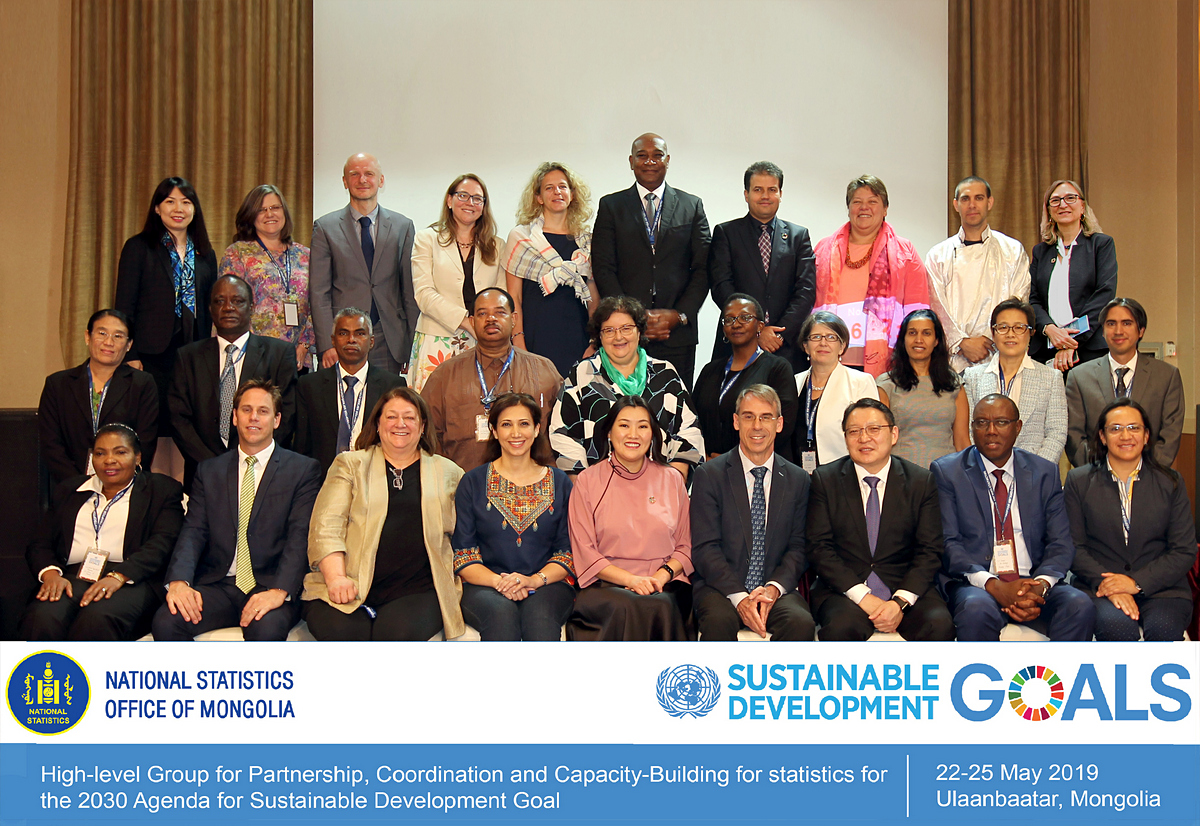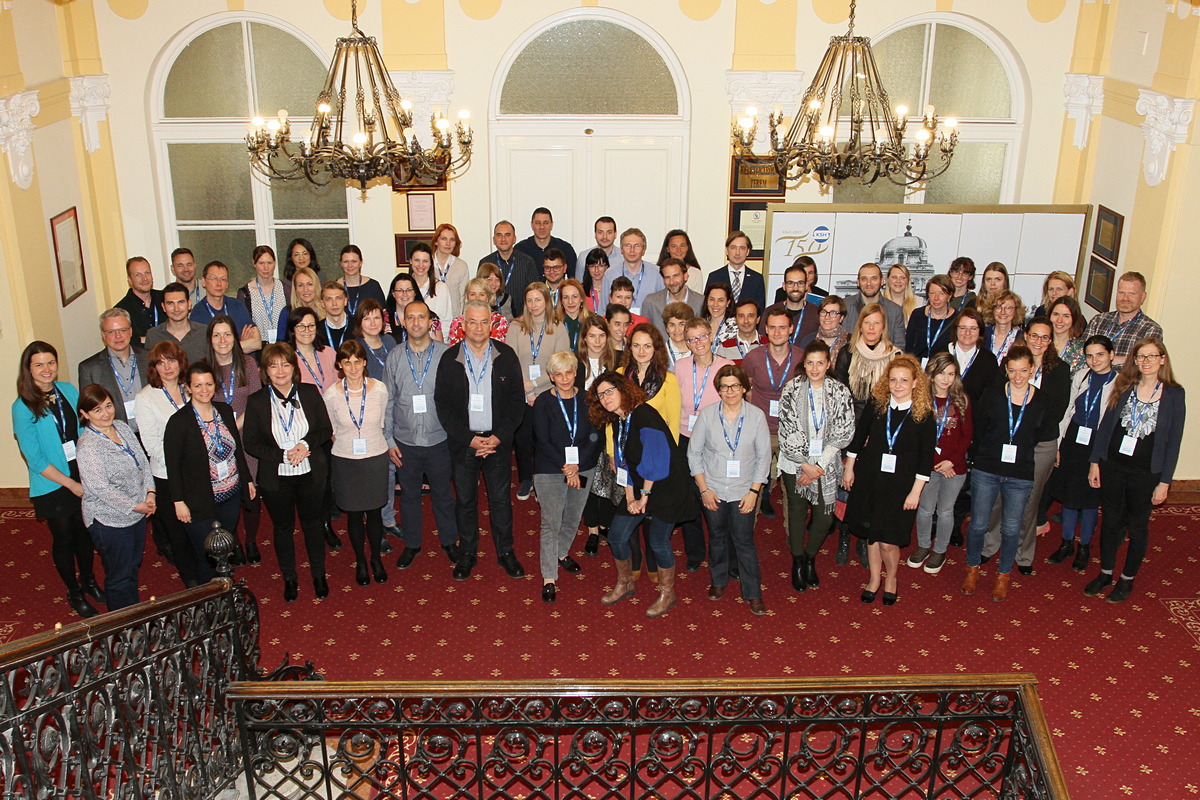Scientific Cooperation
The role of statistics in modern science
The Hungarian Academy of Sciences hosted the international conference of the Hungarian Central Statistical Office on World Statistics Day
The Hungarian Central Statistical Office (HCSO) held an international scientific conference entitled Statistics and Science on October 20, 2025, in the ceremonial hall of the Hungarian Academy of Sciences to mark World Statistics Day. At the English-language symposium, renowned Hungarian and foreign experts from various scientific fields discussed the interactions between statistics and science, as well as the latest trends in data-driven research and decision-making. The aim of the conference was to draw attention to the role of statistics in the development of modern science and to highlight the synergies that arise from the collaboration between quantitative methods and various scientific disciplines.
László Péter Kollár, Secretary General of the Hungarian Academy of Sciences, Áron Kincses, President of the Hungarian Central Statistical Office, and Tiina Luige, Director of the Statistics Division of the United Nations Economic Commission for Europe (UNECE), gave welcoming speeches at the event. The first section of the conference was opened by Tobias Thomas, Professor at the University of Graz, who explained how modern statistical data infrastructures help to develop and accelerate research. Barnabás Virág, Vice President of the National Bank of Hungary, examined how statistical data contributes to the basis for future economic policy decisions. Dejan Stankov, Director General of the Statistical Office of North Macedonia, discussed the effects of cooperation between statistical offices and the academic sphere. Etienne Caruana, Director General of the Statistical Office of Malta, concluded the first part of the conference by presenting the opportunities and challenges of modernizing statistical offices.
In the second section, László Windisch, President of the State Audit Office, explained how his office uses data in its audit processes. Péter Halmai, President of Section IX of Economics and Law of the Hungarian Academy of Sciences, reviewed the trends and challenges of potential economic growth in the European Union and its member states. Finally, Viktor Jáger, Head of the Methodology and Innovation Department at the Hungarian Central Statistical Office, presented how innovative technologies and artificial intelligence support the production of official statistics. The closing remarks of the conference were summarized by Tamás Tóth, Deputy President of the HCSO.
The presentations confirmed that statistical methods actively support scientific results. Modeling, predictive analysis, machine learning, and the discovery of patterns in data play a key role in a wide variety of disciplines, and the Hungarian Central Statistical Office, as a research-oriented, innovation-based scientific institution, plays an active, proactive role in this process.
World Statistics Day has been celebrated by the global statistical community since 2010, on the initiative of the United Nations, with the aim of raising awareness of the role of reliable, accurate and timely statistical data in understanding social and economic processes.
HCSO representation at the 3rd International Statistics Forum
The 3rd International Statistics Forum of the Commonwealth of Independent States (CIS), under the title “Prospects of Statistics: International Projects” was held in Baku from 24 to 26 September 2025. At the invitation of the Chairman of the State Statistical Committee of Azerbaijan, the Hungarian Central Statistical Office was represented by President Dr. Áron Kincses and Dr. Tímea Cseh, Head of the National Accounts Department.
The international event focused on current statistical topics such as the System of National Accounts 2025, preparations for the 2030 round of Population and Housing Census, monitoring of Sustainable Development Goals indicators, and data integration with smart technologies.
The forum provided an important opportunity for representatives of national statistical offices to share knowledge and experience, with a particular focus on the institutional capacity for the successful implementation of international statistical projects, and issues related to the application of innovative methods.
The High-level meeting of the Hungarian Presidency of the Council of the European Union on the future of European statistics took place on 12-13 September 2024 at the Anna Grand Hotel in Balatonfüred.
The meeting provided a platform for Directors-General and Presidents of Eurostat and national statistical institutes of the European Statistical System (ESS) to exchange views on a common vision for the ESS for the years to come.
The discussions were organised around three pillars: data, methods, and operations. Each pillar was divided into three breakout sessions, which were moderated by the chief statisticians of Malta, Austria, and Croatia on the first day, then Greece, Iceland, and Switzerland, as well as Czech Republic, Sweden and Belgium on the second. Findings of the breakout sessions were later presented to the plenary which was chaired by Spain, concerning the data pillar, and by Finland, on the subjects of the methods and operations pillars.
From this perspective, the participants looked at the challenges and opportunities for official statistics producers of the new data ecosystems and strategies to continue producing high-quality statistics in response to the evolving information needs of users and stakeholders. The participants also discussed the integration of new data sources, harnessing technologies, especially artificial intelligence, and forging new partnerships with data holders and academia for producing timelier and more detailed European official statistics.
The participants concluded to continue discussions to further elaborate on the new common vision of the ESS for the years to come.
Official visit by the President of the Statistical Office of the Slovak Republic
On 16 July 2024, the President received in our Office Mr. Ing. Martin Nemky MBA, the President of the Statistical Office of the Slovak Republic, who was accompanied by Director JUDr. Cyntia Vlčková. Besides President Dr. Áron Kincses, Dr. Rita Kelemen, Advisor to the President, received the Slovakian delegation. The short meeting was primarily held to strengthen the relations between the two countries, by promoting gaining professional knowledge from each other.
Director General of Statistics Austria visited the Hungarian Central Statistical Office
On 5 July 2024, Áron Kincses, President of the Hungarian Central Statistical Office, hosted Tobias Thomas, Director General of Statistics Austria.
The aim of the visit was to strengthen the relationship between the two institutions and to broaden their knowledge of each other's good practices and innovative solutions. During the meeting, experts of the Hungarian Central Statistical Office presented their concept of administrative and alternative data use to improve efficiency and timeliness through machine learning and artificial intelligence, and the renewal of the Hungarian Intrastat system. The delegation of Statistics Austria gave an insight into their strategic communication and presented the Austrian Micro Data Centre. On the discussed topics many questions and suggestions were raised by the participants, which were followed by joint reflection and active exchange of ideas. The two Offices identified several possible areas such as external trade and strategic communication where they can promote each other’s professional development. In the future, they would like to continue the co-operation at expert level as well, aiming at practical results and implementations.
MEDSTAT V – Regional training course at the Hungarian Central Statistical Office
Within the framework of the 5th term of MEDSTAT - Euro-Mediterranean Statistical Cooperation, the course “Human resources management”: Methods and tools for the development of the staff skills and competencies” was held at the Hungarian Central Statistical Office on 8-10 May 2024.
A total of 12 participants arrived from Egypt, Israel, Jordan, Lebanon, Morocco, Palestine and Tunisia and 5 people attended online from Alger and Lebanon. On behalf of the HCSO Dr. Gábor Ákos Csutorás, and Driss Afza, key-expert and MEDSTAT V team leader gave lectures. The three-day long course covered topics such as strategy formulation activities, facilitating new employees’ integration in the organisation procedures, methodological solutions, competency model for statisticians, competency as part of recruitment-selection processes, in evaluation and training. In addition, methodological support in performance evaluation, managerial competency development in practice, knowledge management and building internal training systems, digital solutions in HR administration, internal communication, in distance learning came into discussion. After a brief introduction, presentations were delivered on national and HCSO practices and experiences, followed by an informal exchange of views.
Study visit of statisticians from North Macedonia
Four colleagues from the State Statistical Office of North Macedonia participated in a study visit to the Hungarian Central Statistical Office (HCSO) on 25-26 March 2024. Familiarising with Peer Review related communication strategies as well as with communication tools and activities used in Hungarian audit procedures were the scope of the visit.
The two-day long event offered a comprehensive picture of the HCSO Communication Department’s work, duties and goals, of the experiences related to the three foregoing Hungarian Peer Reviews, recommendations on communication in regard to audits, the latest Peer Review related internal and external communication, as well as communication and cooperation with the extra-HCSO Official Statistical Service organisations.
Our colleagues gained an insight on the current state of affairs at the State Statistical Office of North Macedonia, its goals and on communication ideas regarding the upcoming peer review at their institution. HCSO experts placed focus on the main topics and messages of the Hungarian Peer Review’s communication, on the cooperation between the HCSO and the Official Statistical Service as well as on the adherence to the European Statistics Code of Practice.
Visit of the Czech Presidential Delegation
On 12 and 13 March 2024, the President of the Czech Statistical Office, Marek Rojíček with Vice President Jaroslav Sixta, and Marcela Ernest Jindrová, the Head of the International Department, visited the Hungarian Central Statistical Office. The presidential delegation was received by President Áron Kincses accompanied by Vice-Presidents Gábor Valkó and Dénes Ádám, Presidential Advisor Pál Bóday and Tamara Pál, the Head of the International Relations Section.
The aim of the visit was to strengthen the relationship between the Czech and the Hungarian statistical offices. The consultation has given the opportunity to get to know each other's best practices in the field of automatic coding, use of scanner data and the integration of supply-use tables into national accounts and innovation.
The Czech Republic and Hungary are almost identical in size and population and located close to each other in Central Europe. Beyond the geographical similarities, the historical events of the 20th century have had a significant economic and social impact on both of the countries resulting in similar difficulties that must be faced. These circumstances give rise to a common reflection on the current situation of the countries.
On behalf of our Office, our experts prepared presentations and supported the discussion with relevant data and information. They also shared their experiences and best practices with the Czech delegation to encourage the exchange of views. At the end of the two-day visit Mr Rojíček and Mr Kincses agreed that in the future the cooperation between their offices should be extended.
Study visit with statisticians from Bosnia and Herzegovina
On 4 to 6 March 2024, the Hungarian Central Statistical Office received Bosnian statisticians from three different offices (Agency for Statistics of Bosnia and Herzegovina (BiH/BHAS), Republika Srpska Institute of Statistics (RSIS) and the Statistical Institute of the Federation of Bosnia and Herzegovina (FIS)). The main topic of the visit was "Agricultural Census: Communication and promotion".
The aim of the three-day study visit was assisting the preparation of the Agricultural Census to be implemented in Bosnia and Herzegovina after more than 60 years. The Bosnian colleagues were given an overview of the preparations of the Hungarian Agricultural Census in 2020 and the fulfilment of European and national data requirements. Our colleagues prepared presentations with special emphasis on the developments related to the agricultural census, the methodology applied, the elements of territorial implementation and the controlling of the process. They also introduced the different stages of communication used during the census and the innovative solutions applied in them.
During the visit, the Bosnian colleagues also shared their experiences of the preparations and had the opportunity to discuss them. Our colleagues were dedicated to help them with their advice and support to prepare successfully the agricultural census in Bosnia and Herzegovina.
Study visit from Kosovo and Bosnia and Herzegovina
On 27 and 28 February 2024, the Hungarian Central Statistical Office received five colleagues from Bosnia and Herzegovina and Kosovo to hold a study visit on the topic "Implementing standards for metadata and data exchange".
During the two-day study visit, the Bosnian and Kosovan colleagues were given a comprehensive overview of our Office's metadata management and the use of SDMX. The visit also gave the Hungarian statisticians an insight into the current situation of Kosovo and Bosnia and Herzegovina and the practical experiences of the two offices in implementing SIMS. The experts from the Hungarian Central Statistical Office paid particular attention in their presentations to data transfers and the implementation of SDMX in the census database. They demonstrated through practical examples how metadata can be managed effectively in the statistical data production process. The legal background of data transfers to Eurostat was also presented, as well as how long HCSO has been using EDAMIS and ESS-Metadata Handler and what data transfer channels existed in the past.
ESTAT-2020-PA8-E-AGRI Modernisation of Agricultural Statistics
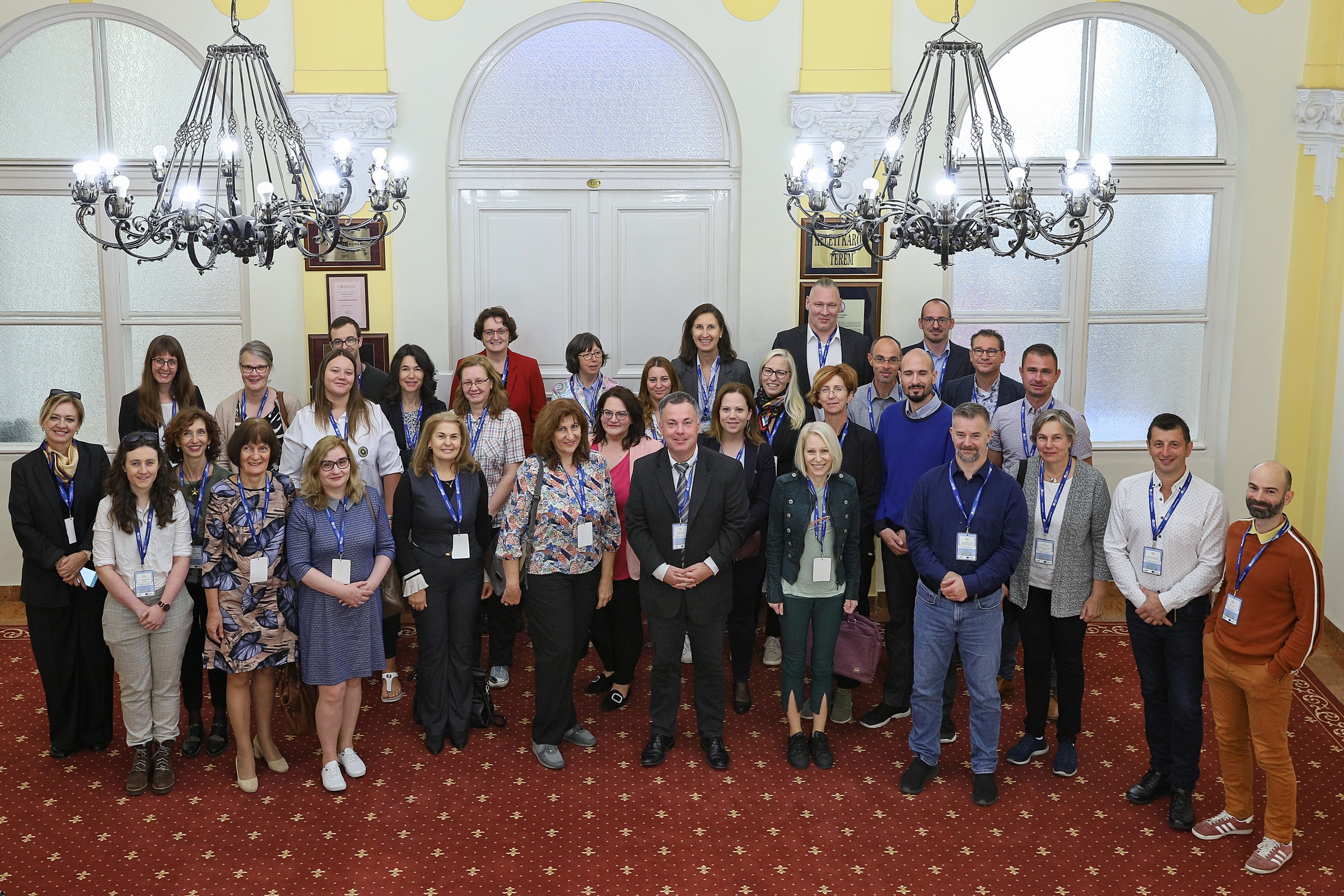 KSH is participating in the Eurostat Grant project (ESTAT-2020-PA8-E-AGRI Modernisation of Agricultural Statistics), which aims to measure agricultural policies more efficiently by linking the results of existing administrative databases and statistical data collections, without increasing the burden on respondents.
KSH is participating in the Eurostat Grant project (ESTAT-2020-PA8-E-AGRI Modernisation of Agricultural Statistics), which aims to measure agricultural policies more efficiently by linking the results of existing administrative databases and statistical data collections, without increasing the burden on respondents.
In the framework of the project, a workshop was organised by the HCSO on 2-3 October 2023, attended by Eurostat and nearly 40 experts from 20 countries (Member States, candidate countries and potential candidate countries). At the workshop, the speakers presented the developments and achievements in agricultural statistics in recent years and provided an opportunity to discuss the presentations.
The presentations of the workshop
Statistical cooperation among V4 countries continues
In the framework of the Slovak Presidency of the Visegrad Cooperation, the Presidents of the Hungarian, Czech, Polish and Slovak National Statistical Offices met in Bratislava on 29 November 2022. The chief statisticians discussed the main statistical challenges in the region, briefly presented the first national results and experiences of the recently completed census. On the agenda was an update of the work programme for cooperation, in which it was agreed to organise expert-level discussions in the field of consumer price statistics and geostatistics. European and international events will provide an additional opportunity for regular consultations at presidential level between the V4 countries.
Study visit of Latvian statisticians to the HCSO
On 11-12 September 2019, staff members from the Central Statistical Bureau of Latvia made a study visit to the HCSO on the methodological modernization of agricultural statistics.
During their stay, they received an overview of the domestic agricultural statistical data collection, the methodology for calculating the soil nutrient balance and its harmonization with the greenhouse gas inventory.
Ágnes Patay, Péter Tóth and Katalin Lovas of the Hungarian Meteorological Service gave lectures during the programme. Our colleagues gained insight into the Latvian Office's agricultural data collection.
The event was a success for both parties.
The 62nd ISI Conference
The 62nd conference of the International Statistical Institute was held in Kuala Lumpur, the capital of Malaysia, on 19-23 August 2019. The International Statistical Institute's biennial global event is the largest scientific forum in the international statistical society. The conference was attended by our President, Dr. Gabriella Vukovich, as a member of the ISI Council and the newly elected Vice President of ISI for the period 2019-2021. Dr. Gabriella Vukovich was formally inaugurated as vice-president by the ISI General Assembly on 22 August 2019 with effect from 23 August 2019 and this was announced at the congress.
As the keynote speaker in the section called ‘Private Public Partnerships to Improve Capacity to Measure SDGs’, our President highlighted the potential of public-private partnerships and emphasized that this kind of collaboration is essential to achieving Sustainable Development Goals and Agenda 2030. The participants also agreed with the idea that the most important and urgent capacity building was the development of users' statistical knowledge. The President of the HCSO, in her keynote address at the section meeting on "Official Statistics: Challenges and Opportunities in the NSOs and Central Banks", emphasized ‘the need for change and flexible adaptation to a constantly changing environment’. The same subject was discussed from a different perspective in a lunchtime seminar, also organized and chaired by Ms President. Those present asked whether the Fundamental Principles of Official Statistics could be matched with threats to official statistics such as lack of resources and new priorities, or how they should be updated, or how official statistics can respond to changing user needs and quality, accuracy, and privacy issues raised by new types of data producers.
This year's congress was also of outstanding importance to the HCSO as five of our colleagues were able to present Hungarian experiences and developments in their field, contributing to the answers to current questions in official statistics.
Ferenc Mújdricza (Methodology Department) Experiences with the theme coding method of cognitive questionnaire testing at Hungarian Central Statistical Office
Ágnes Patay (Sectoral Statistics Department) New ways to increase motivation of respondents in Hungary
Mária Pécs (Methodology Department) Plutus – A new tool to standardise the metadata of seasonal adjustment
Kazimir Ildikó Ritzlné (National Accounts Department) Handling technological changes by time varying coefficient model analysis in flash estimate of gross value added in information and communication industry
András Wéber (Population Census and Demographic Statistics Department) Premature cancer morbidity and mortality conditions through the epidemiological transitions - The case of Hungary, Austria and Denmark
More information about the conference can be found here: https://www.isi2019.org/
Korean study trip
On July 10-11 2019, a delegation of eight guests from South Korea made a study visit to our office. The delegation consisted of senior staff members from the South Korean Bureau of Statistics (Statistics Korea) and Chuncheon and Suwon regional government offices, as well as from the Ministry of Culture, Sports and Tourism and the Ministry of Commerce, Industry and Energy.
During the two half-day visits, our Far Eastern guests listened to lectures on Hungarian and European statistical systems, our international relations, the methodologies and architectural frameworks supporting the statistical data production process of HCSO, the quality management of HCSO as well as on key user groups and new solutions to meet their needs and about our user services.
Csaba Ábry, Norbert Bakos, Edina Mátyás-Bodovics, Dr. Eszter Nagy, Andrea Ordaz-Németh, Andrea Petres, Zoltán Vereczkei and Judit Zeisler gave lectures.
The visit with Hungarian-Korean / English-Korean interpretation was very successful, our guests were interested, asked a lot of questions from our experts, the lectures were always followed by an active conversation.
International Large Cases Unit training at HCSO
At the initiative of the Large Cases Unit Section, our Office hosted a 2-member delegation of Statistics Sweden from 4 to 7 June 2019, who, with the support of grant funding, provided personalized training on how to analyse data of multinational companies.
During this, the Swedish colleagues were given an overview of the views of the department staff and the opinions and expectations of the most affected peer departments and the data collection area. With the information received, they made useful suggestions on how to work more effectively with the largest multinational companies.
The event was a success for both parties.
Study visit of Armenian statisticians to the HCSO
From 27 to 29 May 2019, our office hosted 4 Armenian colleagues at the request of the GOPA consulting firm to share experiences in the topic ‘Agricultural Register and Census’.
During the 3-day study visit, our Armenian colleagues got an overview of the current and planned methodology of agricultural statistics.
The presentations paid particular attention to legal requirements, methodological developments, validation and imputation procedures related to farm structure censuses as well as to the role of the agricultural register in the censuses.
During the visit, our colleagues also gained an insight into the practices and development goals of the Armenian Office.
During the international expert meeting Gábor Valkó, Ágnes Patay, Péter Tóth, Egon Stoll Márk gave professional lectures.
The event was a success for both parties.
HLG-PCCB Conference
Our President, Dr. Gabriella Vukovich, attended the 14th session of the UN High Level Group on Partnership, Coordination and Capacity Building in Ulaanbaatar on 22-25 May 2019. Dr. Gabriella Vukovich is co-president of the group.
One of the main objectives of the event was to continue the dialogue that deals with the quantitative and qualitative financing of such data collections in support of sustainable development objectives, which serve to reduce data gaps and develop mechanisms to strengthen global coordination of statistical capacity development. Another important topic was the preparation of the third UN World Data Forum to be held next October.
14th workshop on LFS Methodology
On 16-17 May 2019, HCSO hosted the annual international methodological meeting of the Labour Force Survey, which focused on data collection. During the workshops, participants discussed methodological issues in the Labour Force Survey that could not be addressed at the Eurostat professional meetings due to lack of time. The primary purpose of the meeting was to exchange views, learn from each other and look for ‘good practices’. Nearly 80 researchers and experts from 36 European countries participated in the workshop. Of our colleagues, Judit Dobszayné Hennel, Ferenc Mújdricza, Éva Németh-Kovács gave successful professional lectures.
Lectures and professional materials can be found on the event's website: https://www.ksh.hu/lfs2019
The Hungarian Central Statistical Office participates actively in bilateral and multilateral international collaborations and in regional cooperation, promoting exchange of experience, common approaches and last but not least professional knowledge-exchange.
Our role in international support projects goes on usually within the framework of consortiums, we also carry collaborations based on bilateral agreements, furthermore we gladly fulfil one-time expertise requests as well.
The close collaboration with our neighbouring countries is outstanding, within it with the V4 countries –since April 2018 according to a cooperation agreement along common goals – the tangible products of it being the comprehensive publications presenting the four countries.
